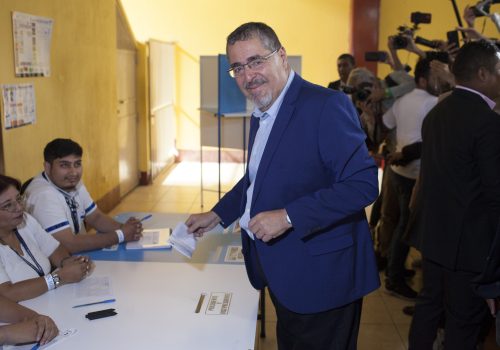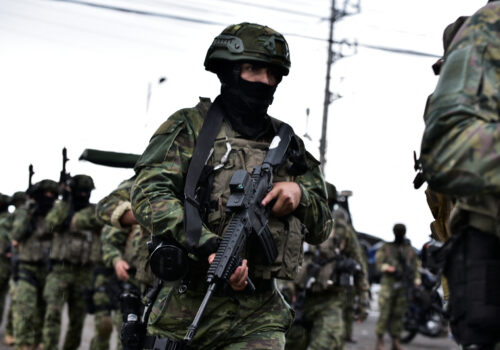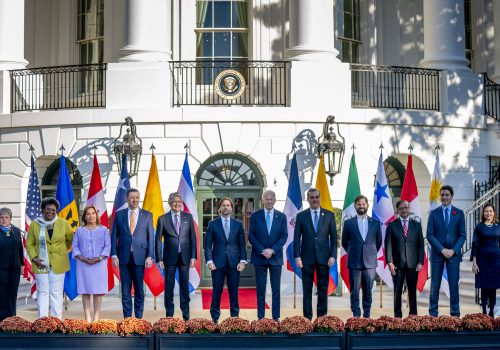To support Guatemala, the US should send a high-level delegation to Arévalo’s inauguration
Guatemala’s presidential inauguration this Sunday is more than a routine handover of power. The world is watching Central America’s largest economy and most populous nation as Bernardo Arévalo is sworn in as president and Karin Herrera as vice president. This event marks not only a new chapter for Guatemala, but also an opportunity for the United States to demonstrate its commitment to democracy in the face of Attorney General Consuelo Porras’s efforts to prevent Arévalo from taking office, despite Arévalo’s victory in last August’s run-off election.
Indeed, this is a moment that demands an unequivocal statement of bipartisan unity in support of democracy by the United States. Moments like these require the United States to reach across the ideological divide and convene a high-level bipartisan delegation. Imagine the power of, for example, two former presidents, Bill Clinton and George W. Bush, standing shoulder to shoulder with the Guatemalan people and attending Arévalo’s inauguration.
One reason to dispatch such high-level, bipartisan representatives is geopolitics. Central America is a region where leaders are increasingly looking to China for more trade, engagement, and aid. Guatemala remains one of just seven countries in Latin America and the Caribbean that has full diplomatic relations with Taiwan, which the United States must not take for granted. The United States must also remember Guatemala’s history, where the shadow of the 1954 Central Intelligence Agency-backed coup d’état still looms over the country. The inauguration, therefore, represents a chance for the United States to proactively support a nation still navigating the echoes of a complex history and politics.
The presence of a high-level, bipartisan delegation in Central America would symbolize a united commitment to democratic values at a critical time when authoritarianism is rising in the neighborhood.
Arévalo’s decisive victory in the run-off vote, which he won by a margin of 21 percent, signals a strong mandate from the Guatemalan people. His announcement that he will form the country’s first-ever gender-balanced cabinet symbolizes hope for a more inclusive future. Yet, his path to the National Palace has been fraught with challenges, led mostly by Porras, who stands accused of corruption by the United States. Traditionally, the United States sends high-ranking current officials—of the administration’s own party—to presidential inaugurations. But the extraordinary nature of Guatemala’s current political climate, the country’s strategic importance as a strong US partner in northern Central America, and its burgeoning economic potential warrant an exceptional response from the Biden administration.
So, what exactly is the message that a bipartisan delegation of two former US presidents would send? It would signal that the United States cares more about Guatemala and the region than it ever has before and that canned photo-ops no longer meet the moment for the people of Guatemala and the more than 1.8 million Guatemalans who call the United States home. The presence of a high-level, bipartisan delegation in Central America would symbolize a united commitment to democratic values at a critical time when authoritarianism is rising in the neighborhood. While neither Clinton’s nor Bush’s records in Latin America are without controversy, their combined legacies—centered on economic ties, immigration, and foreign aid—speak directly to the region’s current needs.
A bipartisan US delegation could also reignite discussions on critical issues like migration, narcotics trafficking, climate change, and citizen insecurity—which is much-needed as the recent developments in Ecuador forebode a potential regional security meltdown.
While Guatemala tests the resilience of its democracy, the United States faces its own test. The choice of who to send to Guatemala’s presidential inauguration, modest though it may seem, is the first part of that test. In the future, choosing to send such a high-level, bipartisan delegation would signal the United States’ dedication to democracy and international cooperation, conveying a powerful message to both domestic and international observers. At a time when the United States has been criticized for a lack of leadership in Latin America, such leadership by example is paramount. Such a delegation would showcase the United States as a united force championing democracy on the global stage, despite its internal divisions.
Maria Fernanda Bozmoski is a deputy director at the Atlantic Council’s Adrienne Arsht Latin America Center.
Further reading
Wed, Aug 23, 2023
Bernardo Arévalo’s against-the-odds rise in Guatemala is chance to improve US relations
New Atlanticist By María Fernanda Bozmoski, Eva Lardizábal
The candidate’s landslide victory in the August 20 presidential runoff election marks a new path for Guatemala and invites deeper US engagement.
Wed, Jan 10, 2024
Ecuador has declared ‘internal armed conflict’ against criminal gangs. What’s next?
New Atlanticist By Isabel Chiriboga
Ecuadorian President Daniel Noboa has mobilized the military to fight criminal groups in his country, following two notorious criminal leaders’ escape from prison.
Fri, Nov 10, 2023
The APEP Leaders’ Summit opened a window for deeper US economic ties with Latin America and the Caribbean
New Atlanticist By Jason Marczak, Martin Cassinelli
The White House's promises at the November 3 summit should be followed up with trade integration efforts, investment goals, and an expansion of the countries involved.
Image: Former US President Bill Clinton (L) and former US President George W. Bush participate in a moderated conversation at the graduation class of the Presidential Leadership Scholars program at the George W. Bush Presidential Library in Dallas, Texas, U.S., July 13, 2017. REUTERS/Brandon Wade


